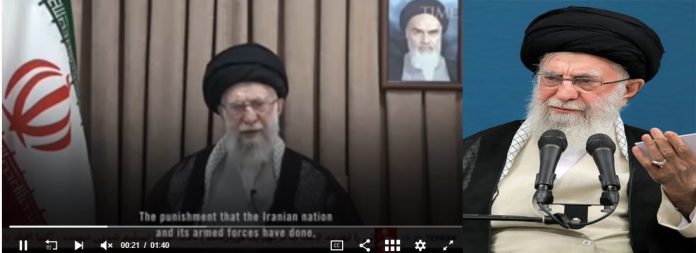– M Rafi Ahmed
It’s going to be doomsday for the US in the aftermath of destroying three nuclear sites in Iran. In a strong condemnation during an address on the nation’s television channel, Iran’s Supreme Leader Ayatollah Ali Khamenei issued a fiery doomsday warning in a televised address, declaring that “no peace can be imposed” on Iran by Israel or the United States.
As tensions escalate in the region, Khamenei condemned recent Israeli strikes and vowed a crushing response if Iranian sovereignty or nuclear assets are threatened. The dramatic statement comes amid intensifying missile exchanges and fears of all-out war. The ongoing conflict between Iran and Israel has now entered its sixth day, with both sides exchanging continuous air strikes.
The hostilities began on Friday when Israel launched attacks on Iranian nuclear sites, claiming Tehran was secretly working on a nuclear weapon, an allegation Iran firmly denies. So far, at least 224 people have been killed in Iran and 24 in Israel, according to official figures. Several global leaders have expressed concern over the burgeoning conflict between Iran-Israel while the US joining Israel in unleashing attacks on strife torn Iran.
United Nations Secretary-General Antonio Guterres, in a formal statement, called the attack a grave escalation. “I am gravely alarmed by the use of force by the United States against Iran today. This is a dangerous escalation in a region already on the edge and a direct threat to international peace and security. There is no military solution. The only path forward is diplomacy. The only hope is peace,” Guterres said.
The Americans should know that any “US military intervention will undoubtedly be accompanied by irreparable damage,” Khamenei had warned. And his statement appeared to be in direct response to comments made by US President Donald Trump. The Iranian leader issued a clear warning to the United States, stating that any military action would have serious consequences.
“It was already suspected that the U.S. was involved in the malicious move carried out by the Zionist regime, but considering their recent remarks, this suspicion is growing stronger day by day,” Khamenei said. Calling out President Donald Trump directly, the Supreme Leader added: “The U.S. President threatens us. With his absurd rhetoric, he demands that the Iranian people surrender to him. They should make threats against those who are afraid of being threatened. The Iranian nation isn’t frightened by such threats.”
Cuba’s President Miguel Diaz-Canel, posting on X, denounced the US action as a violation of global norms. “We strongly condemn the US bombing of Iran’s nuclear facilities, which constitutes a dangerous escalation of the conflict in the Middle East. The aggression seriously violates the UN Charter and international law and plunges humanity into a crisis with irreversible consequences,” he wrote.
Venezuela’s Foreign Minister Yvan Gil, using Telegram, echoed the condemnation and linked the operation directly to Israeli influence. “The Bolivarian Republic of Venezuela firmly and categorically condemns the bombing carried out by the United States military, at the request of the State of Israel, against nuclear facilities in the Islamic Republic of Iran,” Gil said.
Mexico’s Foreign Ministry, in a message on X, avoided direct condemnation but appealed urgently for dialogue. On the subject of whether he gave Iran an ultimatum, the President said: “You could say so. Maybe you could call it the ultimate ultimatum.” Responding to Khamenei’s assertion that Iran will never surrender, Trump said “good luck” to the country, adding that his patience with Iran has “already run out – that’s why we’re doing what we’re doing.” He did not elaborate on what he meant by this.
In this backdrop, former External Affairs and Finance Minister of India, Yashwant Sinha coming down heavily on the BJP-led Modi sarkar that India is committing a big blunder in supporting Israel. Speaking to Arfa Khanum Sherwani, the senior editor of The Wire on how US involvement in a war against Iran could trigger regional instability, economic crisis, global tensions and retaliation, disrupting oil supply and impacting the world economy.
[The author is former Indian Express and Deccan Chronicle chief]




